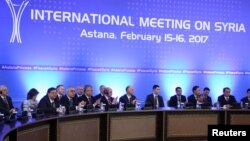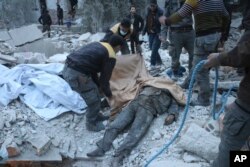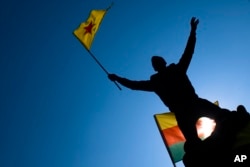A preliminary tripartite meeting among the foreign ministers of Russia, Iran and Turkey is expected to be held in Kazakhstan's capital, Astana, next week to discuss the deteriorating situation in Syria, as well as to set the agenda for a summit on Syria by leaders of the three countries in April.
Kazakhstan's Ministry of Foreign Affairs said Tuesday that diplomats would discuss mechanisms for ending the Syrian crisis at a meeting March 16 in Astana.
Meetings in Astana, which has hosted eight previous sessions, began in January 2017, as a parallel effort to the Geneva peace process initiated by the United Nations to help end the violence in Syria.
Iranian Foreign Minister Mohammad Javad Zarif said the foreign ministers of the "guarantor countries" would meet to discuss ways to reduce the "level of hostilities" in Syria, before the presidential summit in Istanbul in April.
Russia hosted a similar summit on Syria in the Black Sea resort of Sochi in November 2017. The leaders of the three countries — Russian President Vladimir Putin, Turkish President Recep Tayyip Erdogan and Iranian President Hassan Rouhani — agreed on taking the role of guarantors to maintain and strengthen the cease-fire in Syria at the time, although that effort that never fully came to fruition.
Without rejecting the Astana meeting, a U.S. State Department official told VOA that the U.S position on Syria had not changed.
"We continue to support the Geneva process and UNSCR [U.N. Security Council Resolution] 2254 as the means to achieve a political solution in Syria," the official told VOA.
Competing goals
The tripartite meeting and presidential summit come at a time when different players involved in the Syrian conflict are pursuing different goals.
Turkey has been involved in a military offensive named "Olive Branch Operation" on the Kurdish-held enclave of Afrin in northern Syria. The operation just entered its second month.
Turkey justifies its military involvement, saying it is seeking to oust a Kurdish armed force known as the People's Protection Units (YPG), which is the backbone of the Syrian Democratic Forces (SDF).
Ankara views the YPG as a Syrian wing of the outlawed Kurdistan Workers' Party (PKK), a U.S.- and EU-designated terror organization.
For Washington, however, the YPG is a key ally in the war against Islamic State militants in the region.
Last month, U.S. Secretary of State Rex Tillerson met with Erdogan and Turkish Foreign Minister Mevlut Cavusoglu to try to ease tensions over the U.S.-Kurdish YPG alliance.
In a joint statement issued after the meeting, both sides emphasized their long-standing alliance and reaffirmed their partnership and commitment to fight terrorism.
"Turkey and the United States reiterate their resolve to fight against Daesh [an Arabic acronym for IS], PKK, al-Qaida and all other terrorist organizations and their extensions," the joint statement read.
Turkey, however, remains adamant in its opposition to YPG.
Erdogan on Saturday criticized NATO for not supporting the country's military operations against the group.
Speaking to reporters in Turkey, he accused NATO of holding double standards, adding that Turkey had sent troops to conflict zones when requested but had not received support in return when its borders were "under threat right now."
Accusations against Russia
Meanwhile, the U.S.-backed SDF blames Russia for not reacting to the Turkish offensive, despite controlling the airspace over Afrin.
A statement, published by the SDF following the launch of Turkey's offensive, puts the blame on Russia.
"We know that, without the permission of global forces and mainly Russia, whose troops located in Afrin, Turkey cannot attack civilians using Afrin airspace," the statement said. "Therefore, we hold Russia as responsible as Turkey and stress that Russia is the crime partner of Turkey in massacring the civilians in the region."
W. Robert Pearson, a former U.S. ambassador to Turkey and a scholar at the Middle East Institute, said Turkey's intentions were vague and that it wasn't known what Turkey would do after its Afrin campaign was completed.
"The problem, what any army has when it takes territory, is whether it is going to stay there indefinitely or leave," Pearson said.
Pearson added the incursion of Turkey in Afrin raised the risk of a resurgence of IS.
"Turkish operation in Afrin gives the impression that ISIS is defeated completely, while it [IS] still holds some territory on the ground," Pearson said, using an acronym for the militant group.
Distraction
The U.S. has long argued that Turkey's involvement in Syria against Kurdish forces comes at the expense of being distracted from the more important task of fully defeating the remnants of IS in the region.
That distraction has already happened in at least in parts of Syria as the SDF announced Tuesday that it was deploying about 1,700 of its members from the front lines against IS in the Middle Euphrates River Valley to Afrin in an effort to the defend against the Turkish advancements in the region.
"Today we regretfully make a difficult decision of moving our fighters from the east of the Euphrates and the rural areas of Deir el-Zour, who are stationed in the face of terrorist threats, to the front lines of Afrin," Abu Omar al-Idlibi, an SDF commander, said in a press conference last week.
Some information in this report came from The Associated Press.














